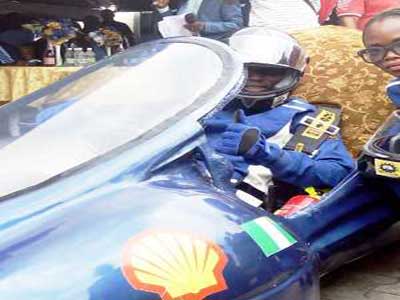 Energy-efficient cars built by Nigerian university students have won laurels at the just concluded Shell Eco Marathon in South Africa.
Energy-efficient cars built by Nigerian university students have won laurels at the just concluded Shell Eco Marathon in South Africa.
Shell Eco-marathon South Africa came to Johannesburg with the ultimate-energy-efficiency challenge. Hosted by the School of Electrical Engineering from the University of Johannesburg, the competition brought together over 100 young engineers from South Africa and Nigeria.
Shell Eco-marathon challenges student teams from around the world to design, build and test ultra energy-efficient vehicles. With annual events first in the Americas, then Europe and Asia, the winners are the teams that go the furthest using the least amount of energy. The events spark debate about future of mobility and inspire young engineers to push the boundaries of fuel efficiency.
Out of the six awards given out at the event, Team Nigeria got two. Students from Federal University of Petroleum Resources (FUPRE), Effurun, Delta State won the two awards, making them the team with the highest number of awards.
Their car raised for 52.9 kilometers on a little of fuel, wining the first position in the prototype vehicle under the gasoline fuel type category.
The team also won an saward for developing the most innovative anti-theft device to secure their vehicle. The team from the University of Lagos came fifth in battery electric prototype vehicle category.
This initiative seeks to inspire young people around the world to develop new approaches and energy-efficient solutions to the future of mobility.
Chairman of Shell South Africa, Bonang Mohale, noted: “We are pleased to work closely with the University of Johannesburg’s School of Electrical Engineering in inspiring the next generation of engineers and in stimulating interest around energy efficiency. We believe that educating young people about the importance of energy is critical to achieving energy security, particularly now when the world has an increased demand for energy.”
This year, 20 participating teams from different high schools and universities in South Africa and within the African continent registered for the competition. The teams are classified under two vehicle categories, that is, Prototype and UrbanConcept. The Prototype category is to be powered by battery electric or gasoline (unleaded petrol). The UrbanConcept cars are powered by gasoline (unleaded petrol) or diesel.
The winning teams designed cars that drive the equivalent of the longest distance using the least amount of energy in their chosen category.



